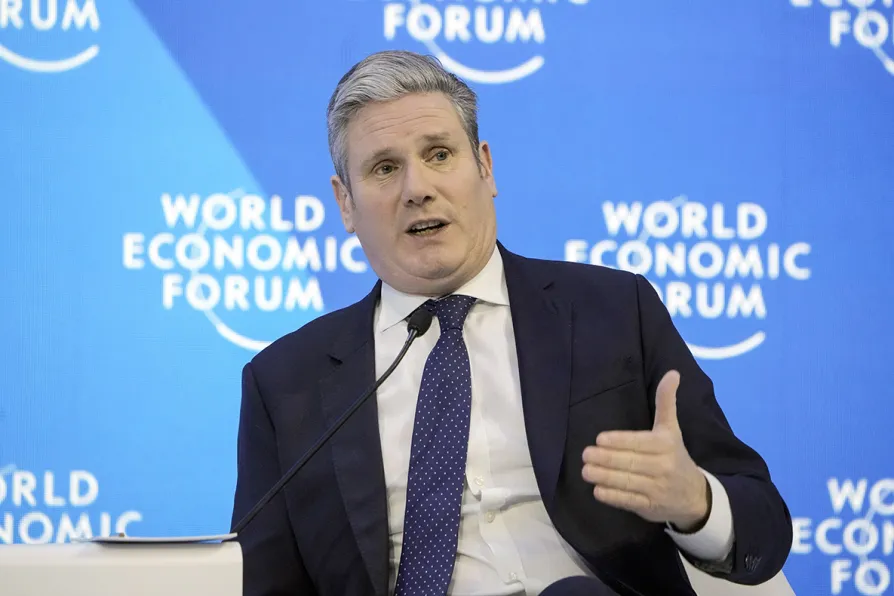
 Sir Keir Starmer speaks at the World Economic Forum in Davos, Switzerland, Thursday, January 19, 2023
Sir Keir Starmer speaks at the World Economic Forum in Davos, Switzerland, Thursday, January 19, 2023
UNLIKE Rishi Sunak, Keir Starmer and Rachel Reeves have been dancing attendance on the disgustingly wealthy at the World Economic Forum — better known as Davos.
Sunak, a super-rich member of a global plutocrat family himself, is keen not to showcase his ties to corporate elites.
For their part Starmer and Reeves want to assure international investors — no doubt of the sort who have done such wonders for our healthcare, railway network and water supply — that in their hands Labour will be “open for business.”
But while Britain’s politicians mouth the same old platitudes about open markets, their system is breaking down.
One Davos voice they should heed is that of International Fund for Agricultural Development president Alvaro Lario, who warns that food supply crises are likely to worsen through 2023.
British households have been hammered by food price inflation over the last year — the government’s own statistics suggest the prices of 30 common foods rose by an average 17 per cent from September 2021 to September 2022, and the figures were much higher for many basics like bread, pasta, tea and vegetable oil.
This spells real pain for millions, but the situation is even grimmer globally. The World Food Programme called 2022 a year of “unprecedented hunger,” with 828 million people going to bed hungry each night.
One cause is the war in Ukraine, which has hit food and fertiliser exports from Ukraine, Russia and Belarus.
But the global climate is also becoming increasingly unpredictable.
Huge regions of east Africa have been hit by five years on the trot of failed rains. Vast tracts of farmland were inundated by Pakistan’s apocalyptic floods. Both Europe and China recorded their worst droughts in hundreds of years last summer.
Westminster is all too typical in refusing to recognise that only far-reaching structural reform of the economy stands a chance of slowing global warming. The droughts, floods and wildfires will get worse in coming years.
Lario did not just warn of the dangers at Davos — he pointed to the rare success stories, noting China’s positive role in providing food security for its own people and “South-South” food supply co-operation.
Few even on the left pay close attention to Chinese economic policy, but more of us should. China’s massive grain reserves — accounting for almost 70 per cent of the global total — ensure resilience in the face of supply chain shocks. At the close of 2021 it estimated its wheat supplies alone would meet national demand for 18 months.
Hoarding, the US calls it — but reserves to shield your population from wild price fluctuations makes good sense in an unpredictable world.
China, like many other countries, also applies price controls to essential foods, a policy tool alien to modern Britain but one which would have an immediate positive impact.
Agricultural output and rural incomes have risen through a mass shift to rural co-operatives under Xi Jinping, with well over 100 million rural households (around 50 per cent) now part of such co-ops.
A joined up approach, where projects like new solar farms are funded for rural co-ops so they can sell energy as well as food, has helped eliminate absolute poverty but also revitalised the rural economy as a whole.
Britain, with its poorly connected farms employing trapped foreign labour and its picturesque dormitory villages with shuttered shops and pubs, could learn a thing or two.
There are serious problems in Chinese agriculture and ecology, and many policies can be critiqued. This is not the point.
Markets are patently failing to deliver security — whether on jobs, energy, food or anything else.
The UN food expert’s praise for China reflects the fact that it recognises the instability of global systems and seeks to reduce dependence on the market.
Its methods merit close attention as Britain’s left develops its own policies — as we will need to — on food security.

One of the major criticisms of China’s breakneck development in recent decades has been the impact on nature — returning after 15 years away, BEN CHACKO assessed whether the government’s recent turn to environmentalism has yielded results

DONG XUE explains why US tariffs hold no significant threat to China












